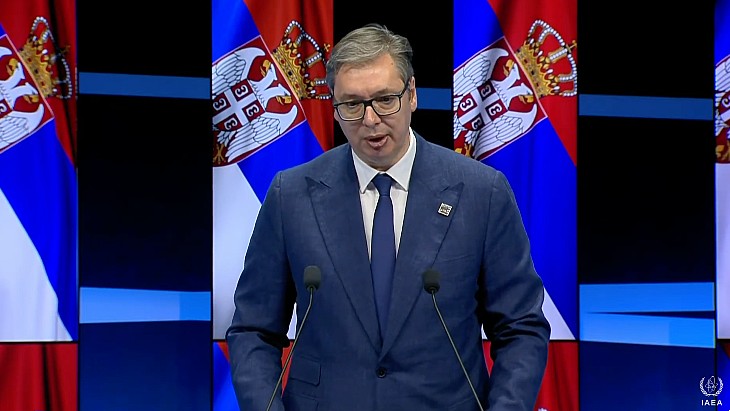Vučić noted that since the break up of the former Yugoslavia, Serbia has not had any experience of nuclear energy, and he welcomed the summit as a chance "to discuss big plans, big things for the future but we don't know how to implement it".
Arriving for the summit he said: "Today it is important that we understand how far behind we are and how we made wrong decisions in the previous 35 and 40 years. The importance attached to this summit indicates to us how much electricity we will lack in the future. To simplify it - without nuclear energy we we will not be able to survive the arrival of artificial intelligence or electric cars."
And addressing fellow leaders and government representatives, he said: "We have three problems. Number one, is that we don't have know-how about the use of nuclear energy and we don't know exactly where to get it. Number two is how are we going to finance all these projects. And I can tell you in advance, that we are very much interested in getting at least four SMRs (small modular reactors) that can replace 1200 megawatts.
"We don't know how to do it, how to finance it, because it costs about EUR7.5 billion up to EUR 8 billion (USD8.7 billion). Anyway, we are ready to participate significantly but we need to have some sort of support from leading countries of the European Union.
"Number three, it means that we also need to get a change of mindset for our people, which is not easy, but we are ready to do it, which means we'll not only adjust, but will have to change, the overall legislative framework, and we'll do it."
The reference to the need for law changes being required is because the construction of nuclear power plants, nuclear fuel production plants and plants for used nuclear fuel processing for nuclear power plants has been forbidden since 1989, predating the breakup of the former Yugoslavia.
He added that he would "like to get a lot of help, particularly know-how for my country" and invited the summit co-host, International Atomic Energy Agency Director General Rafael Mariano Grossi, to visit Belgrade "as soon as possible".
Nuclear medicine
The Nuclear Energy Summit, held in Belgium on 21 March, has been followed this week by the Atomexpo event in Sochi, Russia, with Rosatom Health Technologies and Serbia's health ministry concluding a memorandum of understanding on cooperation in the field of nuclear medicine.















